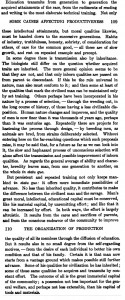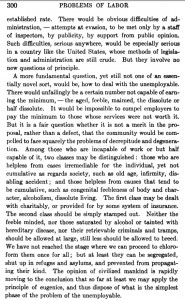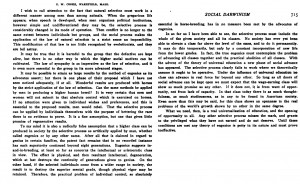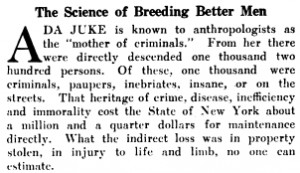Frank Taussig, Principles of Economics, Vol I. 1911. Page 108-109. (This needs to be transcribed. Anyone willing to provide that transcription is welcome to do so. Thanks.)
Category: eugenics
Taussig: The breeding of men, eugenics, and progress. 1911
SOURCE: Frank Taussig, Principles of Economics, Volume II, 1911. Pages 233-237. This movement is steadily extending, and is gradually affecting not only those who are usually thought of as being in a more special sense “native born,” but the descendants of the immigrants as well. The influence of free institutions and of free opportunities is …
The Minimum Wage As Means to Exterminate Defectives: Taussig, 1911
SOURCE: Frank Taussig, Principles of Economics, Volume II, 1911. Pages 299-300. As with legislation on hours, factory conditions, and the like, a compulsory minimum wages rate might serve simply to regulate the plane of competition. All employers would be affected alike; no one could undersell the others by cutting below the established rate. There would …
Eugenics as a Religion and Social Darwinism, Collin Wells
Source: Dr. Collin Wells, “Social Darwinism” a paper presented in 1907, found in The American Journal of Sociology, pages 706-709 Finally, what is the evolutionary value of certain ideals? Let us take individualism, the ideal of democracy, which has tacitly figured in many of the phenomena to which I have already referred. Let us go …
Child Labor Laws as Eugenics Policy
Source: Dr. Frank a Fetter, Cornell University, in a discussion of “Western Civilization and the Birth-Rate”, as found in The American Journal of Sociology, 1907, page 619. The paper mentions but one recent social change which tends definitely and positively to reduce the families of the unskilled classes, namely, child-labor legislation. Such laws as these …
Universal Education a Pre-Requisite for Effective Eugenics Policies
Source: G.W. Cooke, discussing ‘Social Darwinism’ in American Journal of Sociology 12 (March 1907), 714-715. Below the image is OCR scanned text. If anyone would like to send a cleaned edition, that would be greatly appreciated. I wish to call attention to the fact that natural selection must work in a different manner among men …
Sterilization Like Vaccination!
The argument that compulsory sterilization was justified on the same grounds as compulsory vaccination was common, and eventually won Supreme Court Sanction in Buck vs. Bell. Source: “Sterilization: A Progressive Measure?” In Wisconsin Magazine of History, Spring of 1960, wisconsin-sterilization-progressives-21585 As Dr. T.W. Williams of Milwaukee wrote, the fate of the present [compulsory sterilization] bill …
Objections to Compulsory Sterilization “are essentially sentimental.”
While eugenics today is castigated as ‘pseudoscience,’ the eugenicists themselves might say that the chief difference between progressives then versus now, is the latter is hindered by ‘sentimentality.’ E.A. Ross, Letter to Charles McCarthy, January 30, 1907. (As found in Rudolph J. Vecoli’s “Sterilization: A Progressive Measure” in Wisconsin Magazine of History, Spring 1960. LINK: wisconsin-sterilization-progressives-21585 …
Richard Dawkins: Eugenics may not be bad
People who advance ‘eugenic’ ideas while trying to assert that what they are proposing is not ‘eugenics’ at all, but rather a straight-forward inference from evolutionary science, fail to understand that the eugenicists themselves believed they were simply making a straight-forward inference from Darwinism. And, indeed, it is a straight-forward inference, which is why so …
Scientific American: “The Science of Breeding Better Men” 1911
Editorial from a 1911 edition of Scientific American [Source]: Sci-Am’s Editor’s note: This editorial was written and published in 1911. Although our editors of a century ago pondered some lofty aspirations for the orderly future of humans, it was only three decades later that the brutal reality of a Nazi social order suffused with a …





Recent Comments